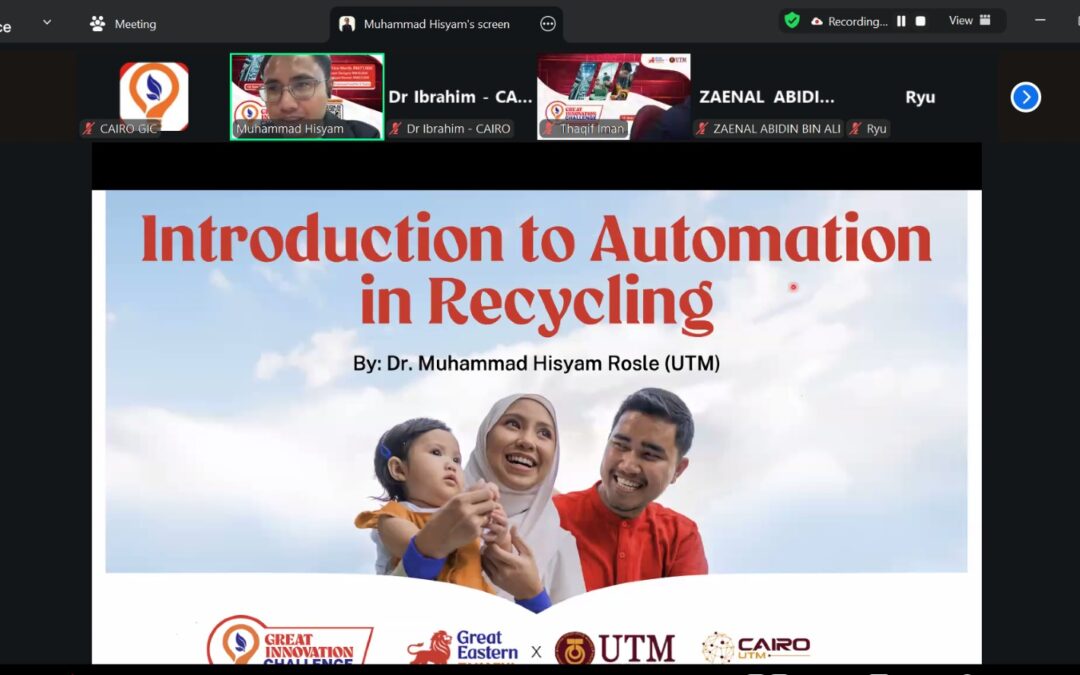Kuala Lumpur, 24 October 2025 — The Great Innovation Challenge (GIC) 2025: Reengineering Plastic for Profit continued into its second day with a highly engaging session led by Dr. Muhammad Hisyam Rosle from the Centre for Artificial Intelligence & Robotics (CAIRO), Universiti Teknologi Malaysia (UTM).
Held online via Zoom, the morning session titled “Introduction to Automation & AI for Process Monitoring” provided participants with practical exposure to automation systems and lightweight AI applications that can be integrated into small-scale plastic recycling machines.
Organised by CAIRO UTM in collaboration with Great Eastern Takaful Berhad (GETB), and IEEE KL Subsection, the workshop forms part of the Year 1 module in the GIC training framework — designed to build student capacity in sustainable design, digital prototyping, and environmental innovation.
![]() Turning Ideas into Intelligent Systems
Turning Ideas into Intelligent Systems
During the session, Dr. Hisyam introduced participants to the fundamentals of automation in recycling systems, including the use of sensors, actuators, and controllers for process optimisation.
He explained how lightweight AI features such as temperature monitoring, predictive maintenance, and automatic shutoff can enhance both efficiency and sustainability.
“Automation and AI should make the recycling process smarter, not more complex. The goal is to create machines that are affordable, energy-efficient, and reliable for community use,”
— Dr. Hisyam Rosle, Trainer & Senior Lecturer, CAIRO UTM.
Teams were also guided through real-world examples of sensor integration, using platforms such as Arduino and Raspberry Pi to demonstrate how data can be collected and visualised through simple dashboards.
Participants later took part in a group ideation activity, brainstorming practical automation features for their own project proposals — including automatic extrusion speed control and real-time heat monitoring.
![]() Innovation with Sustainability at Its Core
Innovation with Sustainability at Its Core
The session reinforced the competition’s emphasis on Environmental, Social, and Governance (ESG) values.
By connecting automation to sustainability, students learned how digital monitoring could reduce energy consumption and waste while supporting circular economy goals.
Dr. Hisyam also reminded participants to focus on feasibility and scalability, ensuring that every design element could be realistically implemented within the given Year 2 prototype budget (RM8,000 per team).
![]() Building the Next Generation of Green Engineers
Building the Next Generation of Green Engineers
Participants from UTM, German-Malaysian Institute (GMI), and Universiti Pertahanan Nasional Malaysia (UPNM) actively shared ideas, receiving real-time feedback from the trainer and peers.
The energy and enthusiasm reflected the challenge’s mission — to empower Malaysia’s young innovators to engineer practical, sustainable solutions to plastic waste management.
As part of the two-day training module, this session marked a significant step towards preparing teams for the next phase: submitting their digital prototype designs and sustainability proposals in November 2025.
![]() About the Great Innovation Challenge
About the Great Innovation Challenge
The Great Innovation Challenge (GIC) 2025 is a two-year national innovation programme spearheaded by Great Eastern Takaful Berhad in collaboration with UTM CAIRO and IEEE KL Subsection.
The initiative challenges students to redesign existing plastic recycling machines into smarter, portable, and eco-friendly systems that can transform waste into high-value products.
The competition offers a total of RM77,000 in prizes and prototype funding, alongside mentorship, hands-on training, and exposure to real-world sustainability practices.
![]() Stay Connected
Stay Connected
Follow CAIRO UTM on Facebook and Instagram for more updates, highlights, and innovation stories from the Great Innovation Challenge 2025.
![]() cairo@utm.my
cairo@utm.my
| ![]() +603-2615 4816
+603-2615 4816



Recent Comments